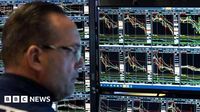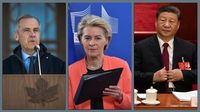As global tensions rise, the European Union, China, and Canada are preparing countermeasures against the United States in response to President Donald Trump’s sweeping tariffs on imports. The stakes are high, and the implications could reverberate throughout the world economy.
On April 2, 2025, Trump announced a new baseline 10% tariff on U.S. imports, with an additional 20% tariff specifically targeting EU imports. This move, which Trump referred to as "Liberation Day" for the U.S., is set to begin on April 9, 2025, while a 25% auto levy on imports took effect immediately on April 3, 2025. European Commission President Ursula von der Leyen, speaking during a press conference in Samarkand, Uzbekistan, expressed deep concern over the potential fallout from these tariffs.
“The tariffs will also hurt consumers around the world. It will be felt immediately. Millions of citizens will face higher grocery bills. Medication will cost more as well as transportation. Inflation will go up,” von der Leyen stated, highlighting the immediate impact on everyday life for consumers globally. She announced that the EU is finalizing a package of countermeasures in response to the tariffs on steel, with further actions planned if negotiations with the U.S. do not yield results.
China's response was swift, with the Commerce Ministry declaring that it would "resolutely adopt countermeasures to safeguard its rights and interests." The tariffs imposed on China are particularly severe, with the levy on Chinese exports to the U.S. increasing to 54%, up from a previous 20%. This escalation in trade tensions has alarmed global markets, as experts warn of potential stagflation and increased costs of living for consumers.
Canadian Prime Minister Mark Carney echoed von der Leyen’s sentiments, stating, "We are going to fight these tariffs with countermeasures." Canada is bracing for potential U.S. levies on pharmaceuticals, lumber, and semiconductors, which could further strain trade relations between the two countries.
The global reaction has been one of shock and concern. French President Emmanuel Macron has called for companies to pause investments in the United States, reflecting the apprehension felt by many leaders. British Prime Minister Keir Starmer urged a measured response, saying, "We must act with cool and calm heads," but the underlying anger and fear of economic chaos is palpable.
Robert Habeck, Germany’s outgoing economy minister, warned that the U.S. "tariff mania could trigger a spiral that could also drag countries into recession and cause massive damage worldwide." As the EU prepares to hold trade talks with Washington, officials are also strategizing on how to bolster alternatives to American products, indicating a shift in global trade dynamics.
Von der Leyen pointed out, "There seems to be no order in the disorder. No clear path through the complexity and chaos," as she outlined the EU's plans for retaliation. The bloc is finalizing its first round of retaliation to U.S. steel tariffs and is preparing for further countermeasures.
In a broader context, Trump's tariffs have not only strained relations with traditional allies but have also prompted countries like China and the EU to consider closer economic ties as a counterbalance to U.S. policies. Analysts speculate that this trade war could inadvertently push these nations together, strengthening their resolve to act against what they perceive as America's bullying tactics.
Trump's recent tariff policies have drawn criticism from various sectors, with many experts warning that the new tariffs could negatively impact stock markets and consumer prices. Following the announcement, stock markets in China, Japan, and Europe experienced significant downturns, indicating investor anxiety about the potential for a prolonged trade conflict.
As the situation unfolds, the implications of these tariffs extend beyond immediate economic concerns. The potential for rising prices on everyday goods, coupled with the risk of a trade war escalating into broader geopolitical tensions, has left many leaders and economists on edge.
China's response to the tariffs has been particularly noteworthy, as the government has pledged unspecified countermeasures, signaling that it will not back down easily. The Chinese leadership is likely to target politically sensitive U.S. exports, particularly agricultural products, as a means of retaliation.
In the meantime, the EU is preparing to implement its own tariffs on American goods, and discussions are underway to address the growing discontent among European nations regarding the U.S. approach to trade. Von der Leyen emphasized the need for negotiations, stating, "It is not too late to address concern through negotiations." However, the growing sense of betrayal among European leaders suggests that trust has been severely damaged.
As the world watches closely, the unfolding trade war raises critical questions about the future of international trade relations and the potential for a new era of economic protectionism. The repercussions of these tariffs could shape global markets for years to come, creating a ripple effect that may alter the landscape of trade as we know it.
In conclusion, the escalating tensions between the U.S. and its trading partners underscore the fragility of global economic relations. As nations prepare their countermeasures, the prospect of a prolonged trade war looms large, with significant implications for consumers and economies worldwide.






